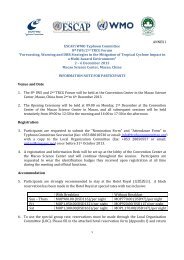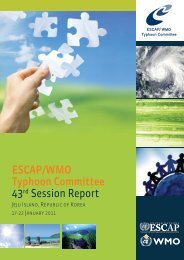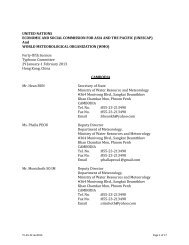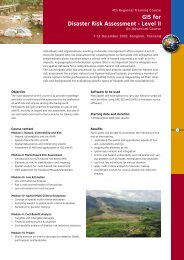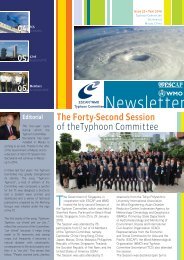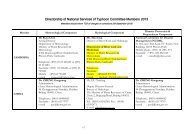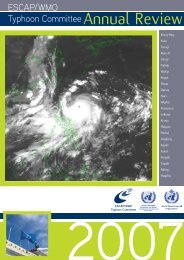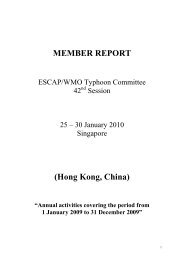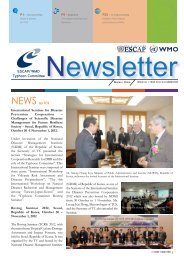TCAR - Typhoon Committee
TCAR - Typhoon Committee
TCAR - Typhoon Committee
Create successful ePaper yourself
Turn your PDF publications into a flip-book with our unique Google optimized e-Paper software.
262<br />
ESCAP/WMO<br />
<strong>Typhoon</strong> <strong>Committee</strong> Annual Review 2009<br />
in this regard, the Council urged the Secretary-<br />
General to take necessary actions to promote the<br />
involvement of operational forecasters in those<br />
events particularly the Seventh International<br />
Workshop on Tropical Cyclones (IWTC) (November<br />
2010) and the Second International Workshop on<br />
Tropical Cyclone Landfall Processes (October<br />
2009).<br />
In reference to its request to the Secretary-<br />
General to facilitate in consultation with UNESCO-<br />
IOC the development of storm surge watch<br />
schemes (SSWS), the Council was pleased<br />
to note that through collaborative efforts of<br />
JCOMM and TCP, immediate actions were taken<br />
by the five TCP regional bodies to assist their<br />
Members by establishing regionally coordinated<br />
frameworks for enhancing their capabilities to<br />
access and understand existing wave and storm<br />
surge products worldwide, and to make use<br />
of them for operational forecast and warning<br />
services. The Council requested the Secretary-<br />
General: (i) to keep Members informed of the<br />
developments and to continue; (ii) to give high<br />
priority to these activities, including facilitating<br />
and supporting the regional associations<br />
concerned in the development of SSWS; and (iii)<br />
to continue capacity-building activities related to<br />
use of SSWS guidance information. The Council<br />
urged Members concerned to take appropriate<br />
actions to improve storm surge and wave<br />
forecast and warning services within their areas<br />
of responsibility.<br />
In recognition of the impacts of the TCP/JCOMM<br />
training workshop series on storm surge and<br />
wave forecasting, the Council requested the<br />
Secretary-General to continue to support such<br />
training workshops in the future.<br />
With regard to the capacity building, the Council<br />
recognized that the developing countries,<br />
especially Small Island Developing States (SIDS)<br />
and the Least Developed Countries (LDCs) are<br />
increasingly more vulnerable to tropical cyclone<br />
impacts due to lack of human resources and<br />
a high degree of economic vulnerability. The<br />
Council reaffirmed the need for sustainable<br />
training efforts especially for SIDS and LDCs to<br />
allow them to achieve skills and competencies<br />
required for effective operational tropical cyclone<br />
forecasting and warnings for minimizing tropical<br />
cyclone disaster risks. In this regard, the Council<br />
noted that the continuing collaboration between<br />
the Tropical Cyclone Programme (TCP) and the<br />
Public Weather Services Programme has proved<br />
its effectiveness in integrated training of tropical<br />
cyclone forecasters in Regions I, II, IV and V. The<br />
Council also underlined the importance of the<br />
transfer of practical techniques to the forecasters<br />
through the attachment trainings at TC RSMCs.<br />
The Council requested the Secretariat to include<br />
forecasters from all affected regions in future<br />
training of this nature.<br />
4.2 Activities of TCP since <strong>TCAR</strong>-2008<br />
The TCP comprises two components: a general<br />
component concerned with methodology and<br />
transfer of technology and a regional component<br />
devoted to the activities of five regional tropical<br />
cyclone bodies. The updated lists of the Members<br />
of these bodies are shown in Appendix I.<br />
4.2.1 TCP events in the past year<br />
For the period from 1 December 2008, the<br />
following events were organized or co-sponsored<br />
under the Programme:<br />
- The 5th TCP/JCOMM Workshop on Storm<br />
Surge and Wave Forecasting (Melbourne,<br />
Australia, 1 - 5 December 2008);<br />
- ESCAP/WMO <strong>Typhoon</strong> <strong>Committee</strong>, 41 st<br />
session (Chiang Mai, Thailand; 19 – 24 January<br />
2009);<br />
- Tropical Cyclone Operational Forecasting<br />
Training at RSMC New Delhi – Tropical Cyclone<br />
Centre (New Delhi, India, 9 to 20 February 2009);<br />
- WMO/ESCAP Panel on Tropical Cyclones<br />
High Policy Working Group, the First Meeting<br />
(Muscat, Oman; 27 – 28 February 2009);<br />
- WMO/ESCAP Panel on Tropical Cyclones,<br />
36 th session (Muscat, Oman; 2 – 6 March 2009);<br />
- The First International Conference on Indian<br />
Ocean Tropical Cyclones and Climate Change<br />
(Muscat, Oman; 8 – 11 March 2009);<br />
- RA IV Workshop on Hurricane Forecasting<br />
and Warning and Public Weather Services (Miami,<br />
USA; 23 March to 3 April, 2009);<br />
- RA IV Hurricane <strong>Committee</strong> 31 st session<br />
(Nassau, Bahamas, 20 – 24 April 2009);<br />
- The First ESCAR/WMO <strong>Typhoon</strong> <strong>Committee</strong><br />
TRCG Technical Forum on EPS, Probabilistic<br />
Forecast and TIPS (Jeju Island, Republic of<br />
Korea; 12 – 15 May 2009);



